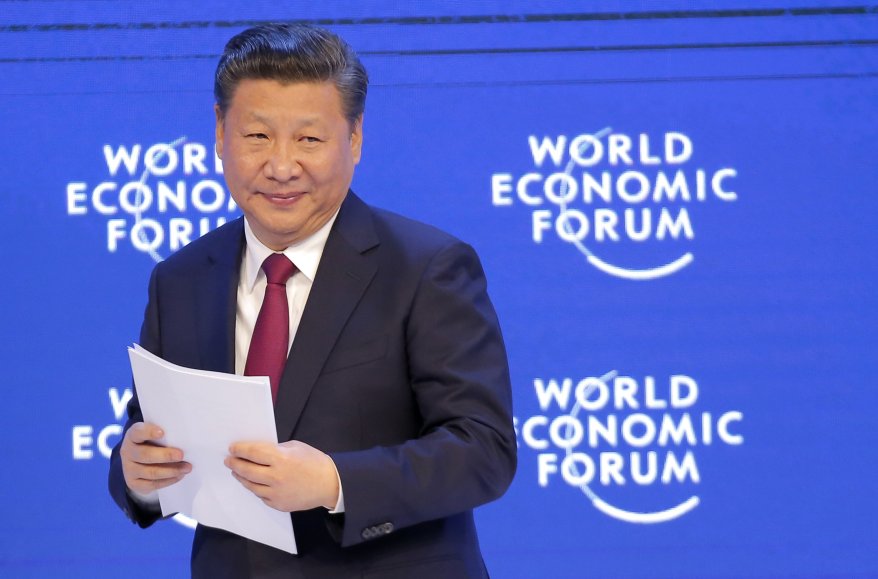Does China Have What It Takes to Lead The Global Economy?
 I just saw a headline in the WSJ, “China Says Prepared to Lead Global Economy if Necessary“, quoting a diplomat in the Chinese foreign ministry’s office of international affairs. President Xi also delivered a speech at Davos where he likened trade protectionism “to locking oneself in a dark room”.
I just saw a headline in the WSJ, “China Says Prepared to Lead Global Economy if Necessary“, quoting a diplomat in the Chinese foreign ministry’s office of international affairs. President Xi also delivered a speech at Davos where he likened trade protectionism “to locking oneself in a dark room”.
This seems pretty ironic or hypocritical given China’s state-directed efforts to import less from the outside world by aiming to produce more and more of the inputs its industry requires within China. China is already “the workshop of the world”, to use the phrase used to describe Great Britain in the mid-nineteenth century. But going forward its aim is to become global leader in most high technology sectors like semiconductors or aerospace with the aim of eliminating its trade deficits in these areas and turning them into surpluses.
These are not the actions of a country that aspires to be global leader. In understanding this consider the US role in the global economy. The US used to be the workshop of the world but has gradually surrendered that role. Up until the 1960s the US still used to export 50% more than it imported.
However this caused a persistent dollar shortage which was a big handicap to the growth of world trade and of the global economy. The US$ had become the global reserve currency after WW2. Developing countries, starting with Japan and Germany after the war, and later South Korea, Taiwan, and then China, adopted mercantilist policies aimed at running surpluses and accumulating US$ reserves.
As leader of the global economy the US played a vital role in this. It opened its markets to Japan and South Korea despite these countries keeping large parts of their home markets closed off to US exports. The US supported China’s application to join the WTO in 2001 and accepted the loss of at least 2 million manufacturing jobs to China as the inevitable consequence of globalisation. It did not take action against countries like Japan, South Korea, Germany and China that kept their currencies undervalued and chose to accumulate enormous US$ reserves rather than spend them, with dire consequences for US employment. As global leader the US has run more or less continuous substantial current account deficits since the 1980s, reaching a peak of over 5% of GDP but currently around 2.6%. China, South Korea, Germany and Japan have all run big current account surpluses. China’s surplus was around 3% of GDP in 2015.
Without US willingness to tolerate large deficits the global economy, and particularly China, would not have grown at the rate it has. If Xi is serious about China becoming global leader then there has to be a reversal of roles. China has to move from a position of huge current account surpluses to deficits and become the importer of last resort that the US is. It will have to reverse its efforts to discourage imports and become wholly self-sufficient and instead accept the export of manufacturing jobs to other countries in Asia such as India, which already has a larger and much younger workforce.
Interestingly the incoming Trump administration has said it wants to change US economic policy more towards those adopted by bad global citizens like China, Japan, South Korea, Germany and Singapore (which runs a deficit with the US but a huge current account surplus of about 20% of GDP). It wants to focus on bringing manufacturing jobs back to the US and changing the US corporate tax system, which is currently designed to favour imports over exports and rewards US companies for moving production overseas. If these changes are enacted they will put more pressure on surplus countries to change their economic policies or doom their economies and the world’s to years of stagnation, even negative growth. Despite PM Lee’s “alternative truth”, in which the Singapore economy is doing just fine with current policies, this is the future that faces Singapore unless we adapt.
So despite all the self-serving talk from China about the benefits of free trade (on China’s terms of course) and its willingness to become global leader, you should not expect that to happen any time soon.



Not only to material goods but China must also open up to the international electronic media. So long as Facebook and Google are banned and the country erects ever higher Great Firewalls to keep out views it regards as unpalatable (or to promote its own domestic versions of these services), it can never really replace the US as global leader in the 21st century. It is very frustrating when travelling in China on business where neither Gmail nor my Mac Mail work.
Xi has an opportunity to move China into the vacuum created by Trump’s rhetoric (fortunately only rhetoric so far) but only if he takes a suitably global view of the situation. Trump is actually a godsend for China but only if it plays its cards well.
LikeLike